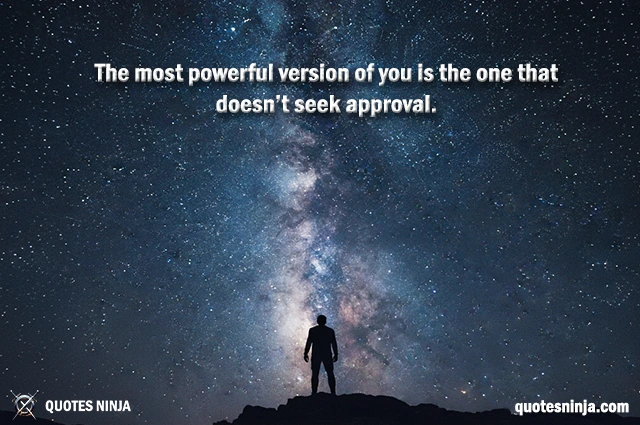
Deeper Meaning of Authenticity Quote
Authenticity Quote: “The most powerful version of you is the one that doesn’t seek approval.”
The quote, speaks to inner confidence, authenticity, and self-sovereignty. Let’s break it down:
1. “The most powerful version of you”
This refers to your highest, most authentic self — the version of you that acts with clarity, confidence, and purpose, not fear or doubt. Power here isn’t about control over others, but about inner strength — being grounded and self-directed.
2. “…is the one that doesn’t seek approval.”
Seeking approval means basing your choices, words, or identity on how others will perceive or judge you. When you stop doing that:
- You’re no longer controlled by others’ opinions.
- You make decisions based on your values, not external validation.
- You can express yourself honestly and take risks without fear of rejection.
The core message
When you stop chasing validation, you reclaim your energy and freedom. Your sense of worth no longer depends on whether people agree, like, or praise you — it comes from within.
That’s what makes you powerful: your self-belief becomes unshakable.
Or, in simpler terms: True power is self-approval. Once you trust yourself, no one else’s opinion can limit you.
A story inspired by Authenticity Quote “The most powerful version of you is the one that doesn’t seek approval.”
Authenticity Story: “Mulan’s True Strength“
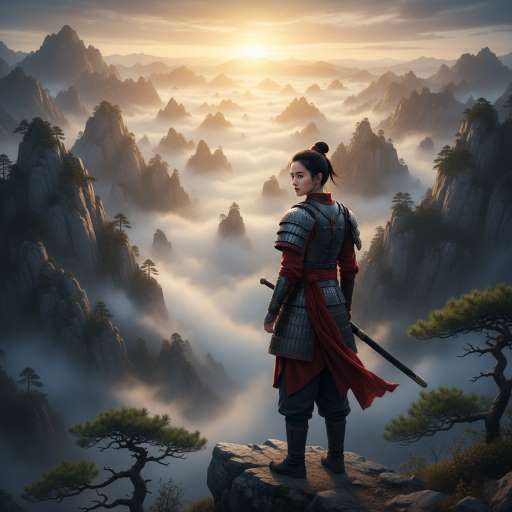
Misty Mountain Dawn:
The morning mist clung to the mountains as Hua Mulan tightened the straps of her armor. She had disguised herself as a man to join the army in place of her ailing father, but her heart pounded not from fear of battle—it pounded from fear of failing the world around her. Ever since childhood, she had sought approval: her father’s pride, her mother’s praise, the Emperor’s acknowledgment.
However, today, she realized something. The whispers of expectation, the judgmental stares, and the weight of tradition could no longer dictate her actions. She had
chosen her path, and though the world might never fully accept it, she had to be true to herself.
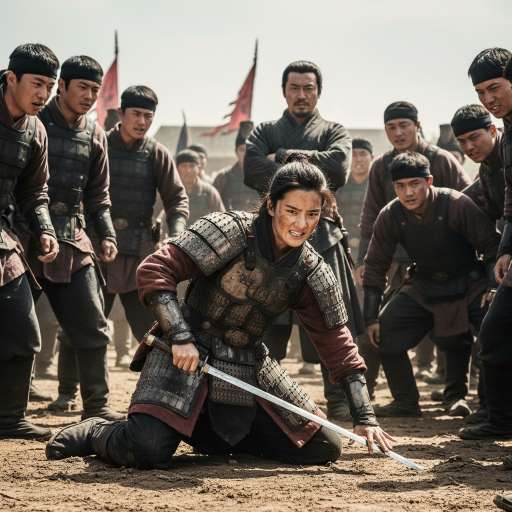
Training Camp Struggle:
The first day of training was brutal. Commander Tung barked orders with sharp precision, and the other recruits, unaware of her true identity, tested her every move. Mulan stumbled through the drills, and every misstep felt like confirmation that she didn’t belong. Yet, instead of curling inward, she inhaled deeply, reminding herself that she fought for more than approval.
Gradually, she learned to anticipate the sparring attacks, to balance strategy with strength, and to harness her inner agility. By the end of the day, she had improved, but more importantly, she had begun to trust herself. She
didn’t need the nod of her comrades or the approving glance of her commander—her confidence grew from her own acknowledgment of progress.
During evening drills, she watched the mountains glow under the sunset, and her mind drifted to her family. Her father had always encouraged her to be strong, yet she remembered his gentle voice tinged with worry. For years, she had strived to meet his expectations. Now, she realized she didn’t have to perform for anyone. Approval, though comforting, was not the source of power. Self-belief was.
The army’s training escalated. The recruits faced grueling tests of endurance, swordsmanship, and strategy. Each time Mulan overcame a challenge, she felt a spark ignite inside her—a spark that was independent of others’ recognition. Slowly, her actions became bolder. She suggested maneuvers during drills, pushed herself beyond exhaustion, and inspired others without seeking praise. Her strength was no longer measured by their approval but by her own determination.
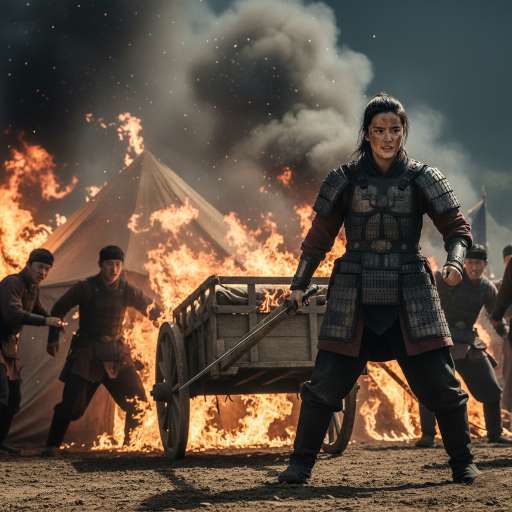
Saving the Wagon from Fire:
One night, a fire broke out in the training camp. Panic surged as soldiers scrambled, and a wagon carrying supplies teetered dangerously close to the flames. Without hesitation, Mulan dove into action. She pulled the wagon to safety, shouted directions to the other recruits, and even carried a fellow soldier away from danger.
When the flames died down, Commander Tung approached her. He looked her over with a scrutinizing eye, yet there was no reprimand—only the silent acknowledgment that she had acted with courage. Even
then, Mulan didn’t seek his approval. She walked away, her chest rising with steady breaths, realizing that her power came not from recognition but from choosing the right action in the moment.
Soon after, news arrived that the Rouran warriors had breached the northern border. The army prepared to march, and Mulan faced her greatest test yet. She donned her armor with resolve and rode with the troops, aware that the battlefield would demand everything she had. She was no longer the girl who tiptoed around expectations; she was a warrior who acted according to her own conscience and abilities.
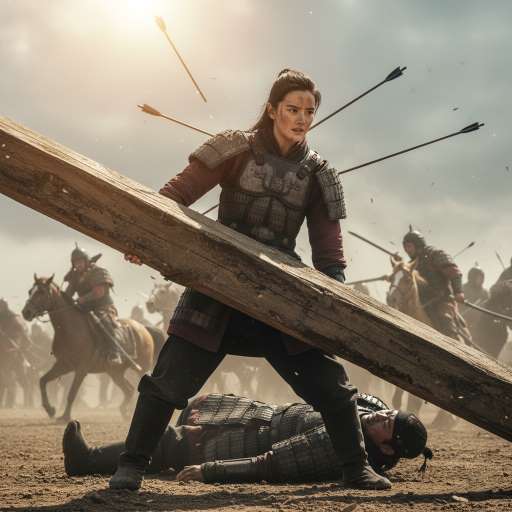
Battlefield Bravery:
During the clash with the Rouran, she spotted a commander trapped under a fallen beam. Soldiers hesitated, fearing for their own lives. Mulan didn’t. She lifted the beam with a strength born of conviction, saving the man and turning the tide of the fight. As arrows rained down, she charged with precision and fearlessness.
In the heat of battle, she thought not of glory or acknowledgment. Instead, she acted purely because it was necessary. Every strike, every decision, every daring move was hers alone, guided by self-trust rather than approval.

Revealing Her Identity to the Emperor:
After the victory, the Emperor himself arrived to recognize the soldiers. He praised the army’s bravery and sought the name of the mysterious warrior who had turned the tide. When Mulan stepped forward, she removed her helmet, revealing her identity as a woman. Gasps rippled through the crowd. Some whispered disbelief, others admiration, but Mulan did not bow for approval. She did not need the Emperor’s nod to validate her strength.
She simply stood tall, her chin lifted, and her heart steady. In that moment, she embodied the truth she had
discovered through her journey: the most powerful version of oneself emerges not from the applause of others but from the courage to act with authenticity.
The Emperor, seeing her resolve, could only smile. Recognition was optional; Mulan had already found her own power.
Later, back home in the quiet of her family’s courtyard, Mulan removed her armor and leaned against the familiar wooden beams. Her father watched her, eyes glistening, but she didn’t seek his praise. She had already claimed her strength. For the first time, Mulan realized that her journey wasn’t about living up to expectations or winning approval—it was about embracing herself fully.
And as she gazed at the mountains she had once admired from afar, she felt an unshakable sense of freedom. Mulan had proven that true power lies not in recognition but in living authentically, courageously, and without the need for anyone’s permission.
Moral of the story:
Mulan’s story is a testament to the idea that “The most powerful version of you is the one that doesn’t seek approval.” Through courage, self-trust, and unwavering action, she discovered that power comes not from the world’s validation but from the conviction to stand firm in one’s truth. In the end, Mulan was no longer fighting for her father, for tradition, or for recognition—she was fighting for herself, and that made her unstoppable.
To explore more on stories and dive into related ideas, be sure to check out the other posts where we cover all sort of stories related to quotes. Stay tuned for more…..
To explore more on quote topics, be sure to check out the other topics where we cover all categories of quotes. Stay tuned for more…..

